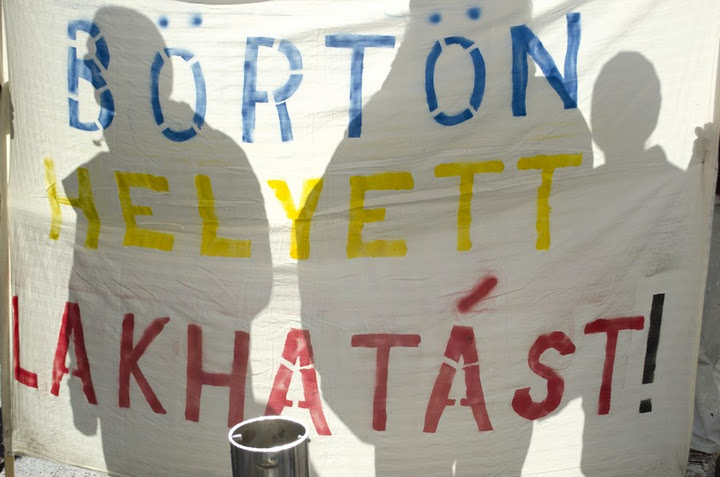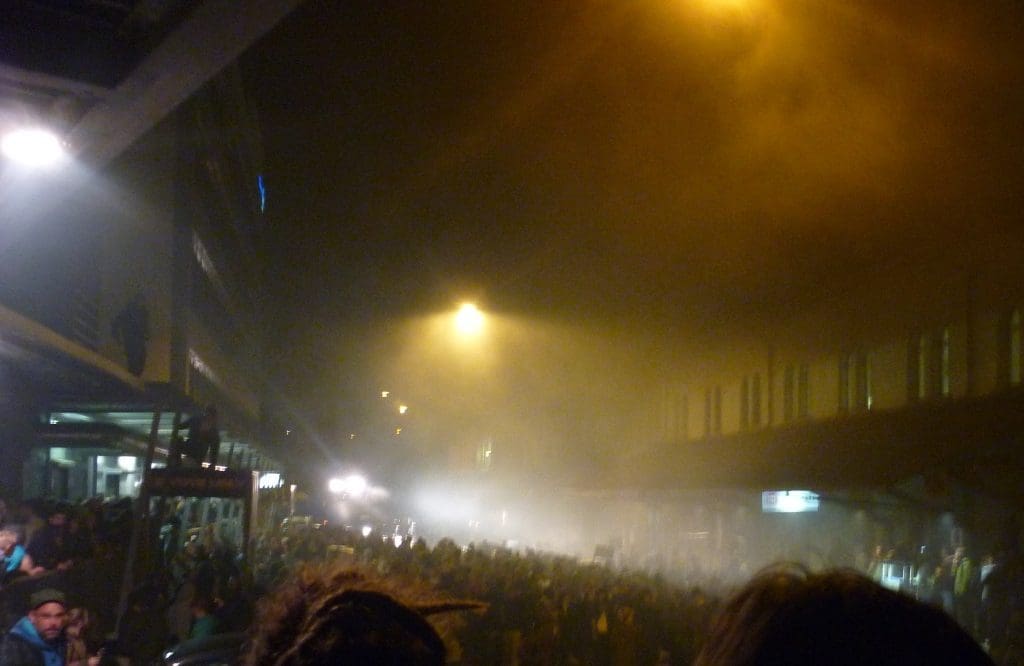AntiNote: This article first appeared in December 2014 on the Böll Foundation website, with link citations that we have not reproduced. It is reprinted here with the permission of the author.
Social Catastrophe In the Making
by Bálint Misetics
It is not only constitutional democracy that Viktor Orbán’s regime treats as its enemy; the Hungarian government has also launched a forceful attack on the welfare state, with predictable consequences: rising poverty and social inequality. No pro-democratic political opposition movement can continue to ignore the immense state-induced suffering of millions of Hungarians; to succeed, we must learn to transgress class boundaries.
An increasing number of news reports and opinion articles in the international press recently have raised awareness of Hungary’s slide toward authoritarianism. A recent example is an editorial by The Washington Post concluding that Prime Minister Orbán “has excluded himself from the democratic West; he and his government should be treated accordingly.”
In July 2013, a resolution adopted by the European Parliament on the situation of fundamental rights in Hungary signaled concern over the Hungarian situation at the otherwise quite oblivious European Union. In September, former American President Bill Clinton referred to Orbán as an admirer of “authoritarian capitalism” who never wanted to leave power, and when President Obama recently listed states that are suppressing civil society groups, Hungary was the only European country he named.
What these critical accounts of political developments in Hungary remain mostly silent about, however, is that it is not only constitutional democracy, separation of powers, the rule of law, and fair elections that Viktor Orbán’s regime treats as its enemy; the Hungarian government has also launched a comprehensive and forceful attack on the welfare state. Essentially all of the legislative changes enacted since 2010 in the areas of social policy, education, housing and taxation have entailed the slow dismantling of the welfare state.
Rolling back the welfare state, punishing the poor
Many of the serious deficiencies in the Hungarian welfare state pre-date the 2010 political changes; an approaching anti-poor policy turn was already in evidence in 2008, with cuts to income protection for the long-term unemployed. The new government, however, has brought anti-poor policies to a new level.
Severe austerity measures have been implemented reducing both the availability and level of social benefits, which has led to a significant decline in the poverty-reduction effect of cash transfers. Eligibility for disability benefits has been severely restricted and tens of thousands of former beneficiaries have partially or entirely lost this support—frequently in unfair revaluations—and approximately half a million long-term jobless citizens do not receive any social benefits at all. The incomes of those living in deep poverty were further decreased by setting the wages paid in the ever-more-extensive “workfare” programs below the statutory minimum wage.
Of the 32 OECD member states, Hungary and Greece are the only ones where real public social spending has decreased since the onset of the economic crisis. The implementation of a flat tax alongside the elimination of low-income tax credits has also increased poverty and social inequality: the new tax system has benefited mostly the top twenty percent of earners—with an especially striking increase in disposable income among the top ten percent—while the tax burden of those earning near the minimum wage has, on average, doubled.
Changes in labor law have further increased the power imbalance between capital and labor by intensifying the insecurity of wage laborers; the curtailment of the right to strike and the abolition of tripartite negotiations will ensure that this predicament persists. Government employees in particular, including teachers, have good reason to fear arbitrary dismissal as retaliation for expressing their political discontent.
The maximum duration of unemployment insurance has been decreased to 3 months, which is the lowest in Europe. In terms of labor market policy, the Orbán regime relies heavily on punitive “workfare” programs, although these have been shown by all available empirical studies to be incapable of helping their participants to (re)access the primary labor market. Further extensions of workfare have been announced recently, even though the Hungarian state has already been spending a disproportionate amount of public resources on these inefficient programs (0.47% of Hungary’s GDP in 2012, in contrast to 0.01% in Poland, 0.02% in the Czech Republic, and 0.07% in Slovakia).
The government’s family policy favors the more well-to-do through generous tax benefits which are inaccessible to poorer families, while the real value of universal family assistance has been continuously decreasing since 2007. Eligibility for family assistance is already contingent on regular school attendance by the family’s children, and the government recently announced plans to make it additionally contingent on employment; this would exclude at least 250,000 children, mostly of the poorest families.
The government (which was formed in 2010 exclusively by men) frequently frames family policies with an explicit affirmation of segregated, unequal gender roles, where women are caregivers and men are breadwinners.
Similar distributive dynamics are at play in the area of housing policy: the politically popular, across-the-board uniform administrative decrease in household energy prices has most benefited those living in larger apartments with greater energy consumption, whereas it has been rather worthless to those households which have already been disconnected from public utilities, and to those several hundred thousand households which must rely on wood (or coal) for heating.
Housing policy in Hungary has long been biased toward those with higher incomes, with disproportionately low public expenditures in support of low-income housing. However, the government has recently decided to discontinue all state responsibility for the provision of housing assistance. According to a recently passed law on the central budget, normative housing assistance and debt-management support will be abolished alongside regular social assistance, and all of these policies will be delegated to under-financed and under-equipped local authorities. This will mean a serious blow to efforts to prevent homelessness, while at the same time the government continues to criminalize homelessness despite a Constitutional Court decision which ruled the practice a violation of fundamental rights.
Consequences: deepening poverty, rising inequality
The aforementioned reconfiguration of the redistributive system in Hungary has already had dire consequences. Four million people are now estimated to live below the subsistence level as calculated by Hungary’s Central Statistical Office. Since the transition to free-market capitalism, the level of poverty has never been so high, the poverty gap (the extent to which the income of those living in poverty falls below the rest of society) has never been so wide, and income inequality has never been so great as they are today.
The extent of poverty as well as its rapid increase in recent years is striking from an international perspective as well. By 2011/2012, the share of population reporting not having enough money to buy the food they needed at some point in the past year had risen to above 30 percent, which was the highest figure in Europe. Equally important is the fact that since 2006/2007, food insecurity has increased the most in Hungary among all OECD countries.
The severity of the Hungarian situation is also apparent in comparison to the other Visegrád countries (the Czech Republic, Poland and Slovakia) in terms of various Eurostat indicators of poverty. Be it the composite index of “people at risk of poverty or social exclusion,” “inability to afford a meal with meat, chicken, fish (or vegetarian equivalent) every second day,” “inability to keep home adequately warm,” or the prevalence of “arrears (mortgage or rent, utility bills or hire purchase),” Hungary fares badly, and increasingly so.
People living in poverty have never been seen as part of Viktor Orbán’s constituency. Instead, the prime minister declared in the parliament that “Fidesz holds the power in the hands of the middle class and exercises it in the name of the middle class.” Importantly, and contrary to this rhetoric, the new distributive regime has been disadvantageous not only to the poorer segments of the population. The pervasiveness of income insecurity is demonstrated by the fact that the proportion of Hungarians who report “inability to face unexpected financial expense” has remained stable in recent years, at the exceptionally high level of over seventy percent. Moreover, between 2010 and 2013 real income has significantly decreased for everyone but the top ten percent.
Everyone is bound to lose
Not only can the regime’s ideological hostility toward the welfare state be inferred from this rather consistent pattern of public policy, but it has also been explicitly declared by the prime minister in many statements where the welfare state was presented in a strict dichotomy with employment and competitiveness (resembling, by the way, the dominant neoliberal discourse of the pre-2010 era).
The level of employment, however, is highest in the most expansive welfare states, which are also regularly ranked at the very top of the Global Competitiveness Index. A major aspect of the welfare state involves—directly or indirectly—the development of educational, cultural and social capital, which represent the very fundaments of economic development. As even researchers at the International Monetary Fund recently concluded, “the combined direct and indirect effects of redistribution—including the growth effects of the resulting lower inequality—are, on average, pro-growth.” Available data do not support widespread assertions about the detrimental effect of redistribution on growth: reduced inequality and sustained growth are rather “two sides of the same coin.”
The policies of the Orbán regime are increasing poverty and inequality, while at the same time jeopardizing the country’s long-term economic prosperity. Moreover, because poorer public health and a variety of social problems such as mental illness, violence, imprisonment, lack of trust, obesity, drug abuse, and poor educational performance are also more common in more unequal societies, essentially everyone is bound to lose under these policies.
But what does this mean for politics? The welfare state, like constitutional democracy, is at a terminal stage in Hungary. A pro-democratic political movement oblivious to the immense state-induced suffering of millions of Hungarians would be both insincere and unfeasible. The key question, therefore, is whether a potent opposition force can emerge which takes workers’ rights, distributive equality and social justice at least as seriously as the reinstitution of democracy, and can mobilize a broad constituency transgressing class boundaries.
As Nelson Mandela said,
“We must address the issues of poverty, want, deprivation and inequality in accordance with international standards which recognize the indivisibility of human rights. The right to vote, without food, shelter and health care, will create the appearance of equality and justice, while actual inequality is entrenched. We do not want freedom without bread, nor do we want bread without freedom.”
Featured Image Source: International Alliance of Inhabitants (translation: “Housing Not Prison”)
For more from Bálint on this and other topics, check out his recent interview with John Feffer at Foreign Policy In Focus’s “Focal Points” blog.





